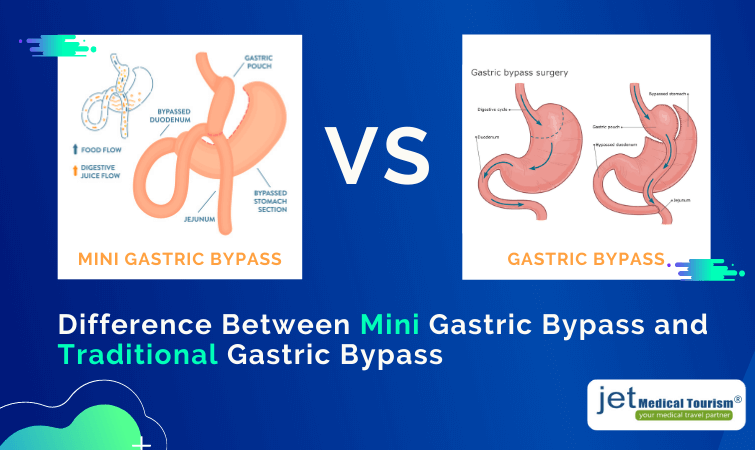Mini Gastric Bypass vs Gastric Bypass

Mini gastric bypass vs gastric bypass comparison is crucial when you are considering these bariatric surgery options for weight loss. Your choice will depend on factors such as your BMI, general health condition, personal goals, and your surgeon’s evaluation. While a full traditional gastric bypass surgery is more popular, you may be a candidate for a mini bypass under specific circumstances.
The advantage with a mini gastric bypass vs. gastric bypass is that it will reduce your operating time in the surgery room, simplify the bariatric procedure, and minimize your risk of complications. At your pre-op consultation, talk to your surgeon about the pros and cons of mini bypass vs. RNY and make a judicious decision after careful analysis. With an experienced surgeon, you can expect excellent mini gastric bypass results.
Wondering about whether to choose mini gastric bypass vs. gastric bypass? Talk to our top-rated bariatric surgeons at Jet Medical Tourism® for the right answers. Contact us now!
What is a traditional gastric bypass?
A full laparoscopic gastric bypass is widely viewed as the gold standard among various weight loss surgery procedures. The surgery is now mostly performed using the Roux-en-Y gastric bypass technique. The procedure is designed to shrink your stomach size so that your capacity to eat and store food in the stomach is reduced. In addition to reducing the stomach, your surgeon will also bypass or re-route your small intestine to cut down your calorie absorption.
Steps Involved in the Procedure
- In the surgery room, a qualified anesthesiologist will place you under general anesthesia
- Your bariatric surgeon will place small incisions in your abdomen
- Using a laparoscope, the surgeon will staple a major portion of your stomach to limit its size
- The surgeon will attach the lower part of your small intestine to the newly created gastric pouch
- The incisions will be closed with dissolvable sutures and the area will be covered with bandages
Advantages of a Traditional Gastric Bypass
- You will achieve rapid weight loss after a full gastric bypass surgery
- Backed by a systematic gastric bypass diet plan, you can lose up to 70 percent of your excess weight within one year
- In addition to weight loss, you can achieve full resolution or reduction in symptoms of obesity-related co-morbidities
- Weight loss results with a full traditional gastric bypass are sustainable and can last for a lifetime
- Your quality of life will improve and your self-confidence, sexual performance, and social interaction will get a boost
RELATED: Gastric bypass pros and cons
What is a mini gastric bypass?
A mini gastric bypass, clinically known as single anastomosis bypass, is a relatively less invasive bariatric surgery to eliminate obesity. The procedure combines some of the most effective weight loss properties of a traditional gastric bypass and a sleeve gastrectomy. Your surgeon will divide the upper portion of your stomach into a tube, and then join it to a loop of your small intestine to create a bypass.
Steps Involved in the Procedure
- An anesthesiologist will place you under regional anesthesia and IV sedation, or general anesthesia
- Your bariatric surgeon will create four to five mini incisions (about 5 to 10 mm each) to perform a keyhole surgery
- Through the incision, your surgeon will staple the upper portion of your stomach to create a new gastric pouch (about 40 ml in size)
- The stomach and the lower part of the intestine will be stitched together to bypass the duodenum
- Your surgeon will then close the incisions with fine sutures and place a compression garment around the area
How does a Mini Gastric Bypass Work?
- The mini gastric bypass works by reducing your stomach size so that you will feel full faster after eating only small meal portions
- About 160 cm of the top portion of your small intestine will be bypassed, which will mitigate your calorie absorption
- Changes to your gut biome will occur, as a result of which your brain will receive quicker signals of fullness and satiety
- The combination of weight loss and gut alterations will help resolve your obesity-related type 2 diabetes
- Mini gastric bypass after gastric sleeve can work to increase the rate of weight loss and help you get rid of obesity
Mini gastric bypass vs. traditional gastric bypass: The key differences
It is vital to understand the mini gastric bypass vs. gastric bypass differences before you determine which one may be the right procedure for you. During your initial consultation, your weight loss surgeon will explain the mini bypass vs. gastric bypass distinctions in thorough detail. Feel free to ask questions at this stage and make a well-considered decision. As long as you work with a reliable and skilled bariatric surgeon, you can expect to receive transparent information about the two procedures.
Eligibility Requirements
- Gastric Bypass: You may be eligible to undergo a traditional gastric bypass surgery if your BMI is 40 or higher, or you have a BMI of at least 35 along with one or more obesity-related co-morbidities.
- Mini Gastric Bypass: The eligibility requirements of gastric bypass vs. mini bypass are quite similar. However, one key difference is that if you suffer from GERD or acid reflux, you may not be eligible for a mini gastric bypass.
Revision and Reversal Possibility
- Gastric Bypass: The traditional gastric bypass surgery is usually an irreversible procedure. However, in exceptional cases, a gastric bypass conversion to duodenal switch surgery may be considered.
- Mini Gastric Bypass: This is a relatively less complex and less invasive surgery, so it is easier to reverse or revise it. Mini bypass after gastric sleeve as well as conversion of VSG to mini gastric bypass are possible.
Cost
- Gastric Bypass: When considering gastric bypass vs. mini gastric bypass, the cost is a fundamental factor. A full traditional gastric bypass may cost about $5,500 to $6,500 in Mexico and over $25,000 in the US or Canada.
RELATED: Gastric bypass cost in Mexico
- Mini Gastric Bypass: Compared to a standard Roux-en-Y gastric bypass, a mini gastric bypass is a more affordable surgery. A mini bypass may cost about $5,200 to $6,000 in Mexico and over $20,000 in the US or Canada.
Recovery
- Gastric Bypass: Following your laparoscopic gastric bypass surgery, you will go through a recovery of about one week to 10 days. You can resume strenuous exercises and lifting of heavy weights in two to three months.
- Mini Gastric Bypass: Recovery of your mini bypass bariatric surgery will be faster and involve lesser discomfort and swelling. You can return to your regular routine in less than a week, and resume full exercises in 45 days.
Insurance Coverage
- Gastric Bypass: The traditional gastric bypass surgery is a well-established procedure, and is widely covered by health insurance companies. Before going ahead with the procedure, talk to your insurer about your eligibility for coverage.
- Mini Gastric Bypass: You should be aware of the views of insurance providers when it comes to mini gastric bypass vs. gastric bypass. Most insurers do not recognize mini bypass for coverage because it is a relatively recent surgery.
Complications
- Gastric Bypass: With laparoscopic Roux-en-Y gastric bypass surgery, your risk of complications is reduced. However, in exceptional cases, problems such as hiatus hernia, ulcerations, anastomotic leakage, or gallstones may occur.
- Mini Gastric Bypass: Mini gastric bypass results are usually free of complications because the procedure is less invasive. But in a few cases, acid reflux may occur if gastric juices leak into the new small stomach pouch.
Benefits
- Gastric Bypass: The procedure is ideally suited for people with a higher BMI who also have underlying medical conditions such as diabetes. Results are more predictable and researchers have sufficient medical data available on gastric bypass.
- Mini Gastric Bypass: Benefits of mini gastric bypass include reduced risk of complications, less intestinal re-routing, shorter operating time, faster and more comfortable recovery. Weight loss results are often similar.
Diet
- Gastric Bypass: Dietary restrictions are more stringent in case of gastric bypass. To achieve the desired results, you must follow your surgeon’s prescribed gastric bypass diet and take vitamin supplements lifelong to avoid nutritional deficiency.
- Mini Gastric Bypass: In case of mini bypass, the pre- and post-op diet is relatively more relaxed because your food tolerance after this surgery will be better when compared to a standard bypass. Nutrition supplements may still be necessary.
Success Rate
- Gastric Bypass: Although this surgery is relatively more invasive, the success rates are outstanding. You can expect to achieve up to 70 percent weight loss in the first 12 months, and with diligent diet management, you can be 100% obesity-free in 24 months.
- Mini Gastric Bypass: Weight loss rate will be slightly slower initially, but in about two years after the surgery, you may achieve similar mini gastric bypass results as you would expect from a traditional surgery. Success rate of the procedure is fairly high.
Mini gastric bypass vs gastric bypass: Similarities
The fundamental metabolic surgery principles in both traditional and mini gastric bypass remain the same. Although a gastric bypass vs. mini gastric bypass will have significant differences in terms of weight loss rates, complication rates, operating time, and recovery time, the final outcomes in the long run are similar.
Three essential similarities between the two procedures are as follows:
Both Procedures are Restrictive
Mini bypass vs. gastric bypass are both restrictive procedures, which means they will restrict the amount of food you can consume at one time. The size your stomach pouch will be reduced in both surgeries. As a result, you will feel full rather quickly after you eat only small portions of food.
Both Procedures are Malabsorptive
Mini gastric bypass vs. Roux-en-y gastric bypass are both malabsorptive surgeries. Some degree of reconfiguration of your small intestine will be involved in both the procedures. This will allow much of your food to bypass the intestine. Consequently, your calorie absorption will be lower.
Both Procedures Induce Gut Changes
Mini bypass vs gastric bypass both are aimed at making health alterations to your gut biome. These surgeries will change the propensity of hunger hormones and alter the metabolism of gastric pH and bile acids. All these changes impact energy homeostatis, and promote weight loss.
Mini gastric bypass after gastric sleeve
Mini gastric bypass after sleeve surgery is a type of revision procedure that may be necessary if you do not achieve the desired weight loss with VSG surgery. The key difference in mini bypass vs. sleeve gastrectomy lies in intestinal changes. Gastric sleeve is not malabsorptive and will only reduce your stomach size. If that procedure fails to work, a mini bypass after gastric sleeve can work to reduce calorie absorption through intestinal rerouting.
The advantage with a gastric sleeve surgery is that it is a less complicated surgery and only focuses on restricting your stomach volume. However, if it does not work, you will have the option of a full traditional gastric bypass or a mini gastric bypass. A mini RNY after gastric sleeve will be relatively less invasive, and yet deliver more effective weight loss results and disease resolution to help you meet your health goals.
Gastric bypass after sleeve surgery
Gastric bypass after sleeve is one of the most effective and proven revision bariatric surgery procedures performed today. Following your primary VSG surgery, if you develop complications or experience weight loss failure, you may consider a revision to gastric bypass. Your surgeon will carefully evaluate the causes of your condition before recommending a sleeve surgery conversion to gastric bypass.
To perform the procedure, your surgeon may use the same incision lines in the abdominal area. Through the incisions, they will reduce your stomach volume (if the sleeve has re-stretched). In the second phase, the surgeon will reconnect the upper portion of your intestine to the lower portion in order to create a bypass for food delivery. Post-VSG complications such as acid reflux can also be corrected with this procedure.
Mini gastric bypass before and after

You should carefully review these images to understand how the mini gastric bypass results may differ from those of a full traditional surgery.
Even before you meet your surgeon for an initial consultation, you may request them to share mini gastric bypass before and after photos online with you so that you are better prepared to make a decision.
Gastric bypass before and after

When you have realistic expectations from the outset, you will be able to achieve more satisfying final results.
Gastric bypass before and after images include a set of pictures belonging to previous patients who have successfully undergone the same procedure.
It will give you more confidence about your surgeon’s skills and will also provide you insights into the procedure from an actual patient’s perspective. Request your surgeon to share these photos at your first consultation.
Mini gastric bypass vs gastric bypass: Which bariatric surgery is right for me?
Now we come to the all-important question of which weight loss surgery is more suitable for you: a standard Roux-en-Y gastric bypass or mini gastric bypass? The truth is that both types of surgery have their own advantages and limitations. Your bariatric surgeon is in the best position to determine which of these procedures will be more effective in your case.
At Jet Medical Tourism®, our accomplished and seasoned weight loss surgeons will evaluate your BMI and other health parameters before recommending the most appropriate surgery for you. Your body needs and your personal goals are unique. Therefore, you must carefully choose between mini gastric bypass vs. gastric bypass. Our surgeons are here to help. Contact us today to schedule a free consultation.




